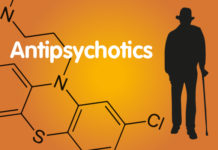Vitamin B6 Effective in Reducing Antipsychotic Induced Akathisia
A recent RCT showed that vitamin B6 is as effective as propranolol for the treatment of akathisia.
Reducing Antipsychotic Use May Improve Health for People with Mental Health Diagnoses
A new study offers radical solutions for improving the cardiovascular health of people with mental health diagnoses: reducing antipsychotic prescriptions..
Anticholinergic Medications Linked to Dementia Similar to Early Alzheimer’s
A new study, published in the Journal of Clinical Psychiatry, investigates the effects of anticholinergic medications, such as antidepressants and antipsychotics, on cognition in older adults diagnosed with schizophrenia.
Scientists Clarify Risks of Augmenting with Antipsychotic Medications for Depression
The researchers found that while antipsychotic drugs may be slightly more effective than alternative antidepressants, they come with a much higher side effect burden.
Children Diagnosed with ADHD Younger are More Likely to get Multiple Medications
New research demonstrates that children diagnosed with ADHD at younger ages are more likely than those diagnosed later to receive multiple medications within five years of their diagnosis.
Patients on Antipsychotics at High Risk for Cardiovascular Issues, Study Finds
Antipsychotics present a known risk for major side effects. A new study suggests that certain antipsychotics may present a greater risk for cardiovascular disease than others.
Outcome Reporting Bias in Antipsychotic Medication Trials
A new study in the journal Translational Psychiatry, an influential journal in biological psychiatry published by Nature, challenges the state of the research on antipsychotic drugs.
Inappropriate Use of Antipsychotics on Adults with Intellectual and Developmental Disabilities
One-third of adults with an intellectual or developmental disability are dispensed antipsychotics, despite having no existing psychiatric diagnosis.
Increased Risk of Movement Disorders From Antipsychotics in Persons with Intellectual Disabilities
Large cohort study demonstrates that those with an intellectual disability are at an increased risk for movement disorder side effects of antipsychotics.
Patients With Schizophrenia Show Better Work Functioning Off Antipsychotics
20-year follow-up study finds that after four years, patients not prescribed antipsychotics have significantly better work functioning.
In Chronic Patients, Antipsychotics Have Limited Efficacy in Reducing Symptoms
A large review and meta-analysis of 167 studies across 60 years dissects placebo-controlled randomized controlled trials of antipsychotic drugs.
Half of First-Episode Patients Respond to Antipsychotics
No placebo controlled trials provide evidence of antipsychotics in first-episode psychosis.
Large Study Confirms Elevated Risk of Diabetes When Prescribed Antipsychotics
A large longitudinal study finds once more that being prescribed antipsychotics significantly increases the risk of diabetes.
Study Shows Clozapine Can Result in Serious Gastrointestinal Complications
A large observational study published in CNS Drugs sheds light on serious adverse effects of the ‘gold standard’ antipsychotic Clozapine.
‘Salami Slicing’ Found in Analyses of Antipsychotic Trials
Evidence of duplicate publishing in articles analyzing data from clinical trials testing second-generation antipsychotics for depression
PTSD and Psychiatric Medication Linked to Dementia in Older Veterans
Veterans diagnosed with PTSD and taking SSRIs, novel antidepressants, or atypical antipsychotics are more likely to develop dementia.
Psychiatry Defends Its Antipsychotics: A Case Study of Institutional Corruption
Jeffrey LIeberman and colleagues have published a paper in the American Journal of Psychiatry stating that there is no evidence that psychiatric drugs cause long-term harm, and that the evidence shows that these drugs provide a great benefit to patients. A close examination of their review reveals that it is a classic example of institutional corruption, which was meant to protect guild interests.
Study Explores Cognitive Effects of Antipsychotics
Reduced usage of antipsychotics in first-episode psychosis was associated with improved executive functioning.
Danish Study Finds Better 10-year Outcomes in Patients Off Antipsychotics
Study finds that 74% of patients with a psychotic disorder off antipsychotics at end of 10 years are in remission.
Acute Respiratory Failure More Likely in COPD Patients Prescribed Antipsychotics
Researchers recommend that healthcare professionals be vigilant regarding the signs of respiratory failure among patients with COPD who are receiving antipsychotics, especially during the initial treatment phase.
Mental Health Nurses Do Not Routinely Assess for Effects of Antipsychotic Medications
Researchers believe that side-effect monitoring is critical because of the increase in the use of antipsychotics
Withdrawal from Antipsychotics
A review of the scientific literature related to the withdrawal of antipsychotics: animal studies, withdrawal symptoms, tapering success rates, and consumer accounts of discontinuation.
Study Suggests Long-Term Antipsychotic Use May Result in Poorer Cognitive Functioning
Association found between long-term antipsychotic use and poorer performance on cognitive tasks in adults diagnosed with ‘schizophrenia.’
Review Questions Long Term Use of Antipsychotics
Patients who recover from a single episode of psychosis are often prescribed antipsychotics long-term, despite a lack of evidence for this practice
Safety Analysis Weighs Harms and Benefits of Antipsychotic Drugs
The researchers find that the drug effects for reducing psychosis are small and that treatment failure and severe side effects are common.

































